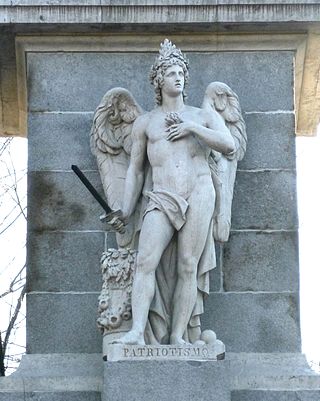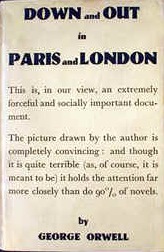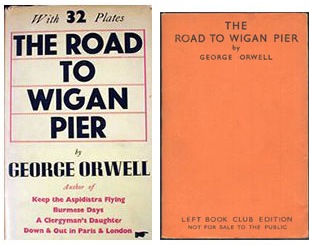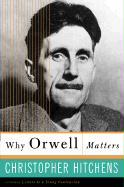
Eric Arthur Blair was an English novelist, essayist, journalist, and critic who wrote under the pen name of George Orwell. His work is characterised by lucid prose, social criticism, opposition to totalitarianism, and support of democratic socialism.

Patriotism is the feeling of love, devotion, and a sense of attachment to a country or state. This attachment can be a combination of different feelings for things such as the language of one's homeland, and its ethnic, cultural, political, or historical aspects. It may encompass a set of concepts closely related to nationalism, mostly civic nationalism and sometimes cultural nationalism.

Down and Out in Paris and London is the first full-length work by the English author George Orwell, published in 1933. It is a memoir in two parts on the theme of poverty in the two cities. Its target audience was the middle- and upper-class members of society—those who were more likely to be well educated—and it exposes the poverty existing in two prosperous cities: Paris and London. The first part is an account of living in near-extreme poverty and destitution in Paris and the experience of casual labour in restaurant kitchens. The second part is a travelogue of life on the road in and around London from the tramp's perspective, with descriptions of the types of hostel accommodation available and some of the characters to be found living on the margins.

The Road to Wigan Pier is a book by the English writer George Orwell, first published in 1937. The first half of this work documents his sociological investigations of the bleak living conditions among the working class in Lancashire and Yorkshire in the industrial north of England before World War II. The second half is a long essay on his middle-class upbringing, and the development of his political conscience, questioning British attitudes towards socialism. Orwell states plainly that he himself is in favour of socialism, but feels it necessary to point out reasons why many people who would benefit from socialism, and should logically support it, are in practice likely to be strong opponents.

Pudding is a type of food. It can be either a dessert, served after the main meal, or a savoury dish, served as part of the main meal.

Thomas Henry Wintringham was a British soldier, military historian, journalist, poet, Marxist, politician and author. He was a supporter of the Home Guard during the Second World War and was one of the founders of the Common Wealth Party.
Karl Dietrich Bracher was a German political scientist and historian of the Weimar Republic and Nazi Germany. Born in Stuttgart, Bracher was awarded a Ph.D. in the classics by the University of Tübingen in 1948 and subsequently studied at Harvard University from 1949 to 1950. During World War II, he served in the Wehrmacht and was captured by the Americans while serving in Tunisia in 1943. Bracher taught at the Free University of Berlin from 1950 to 1958 and at the University of Bonn since 1959. In 1951, Bracher married Dorothee Schleicher, the niece of Dietrich Bonhoeffer. They had two children.

Sir Arnold Henry Moore Lunn was a skier, mountaineer and writer. He was knighted for "services to British Skiing and Anglo-Swiss relations" in 1952. His father was a lay Methodist minister, but Lunn was an agnostic and wrote critically about Catholicism before he converted to that religion at the age of 45 and became an apologist.
What constitutes as a definition of fascism and fascist governments has been a complicated and highly disputed subject concerning the exact nature of fascism and its core tenets debated amongst historians, political scientists, and other scholars ever since Benito Mussolini first used the term in 1915. Historian Ian Kershaw once wrote that "trying to define 'fascism' is like trying to nail jelly to the wall".
A suet pudding is a boiled, steamed or baked pudding made with wheat flour and suet, often with breadcrumb, dried fruits such as raisins, other preserved fruits, and spices. The British term pudding usually refers to a dessert or sweet course, but suet puddings may be savoury.
"The Lion and the Unicorn: Socialism and the English Genius" is an essay by George Orwell expressing his opinions on the situation in wartime Britain. The title alludes to the heraldic supporters appearing in the full royal coat of arms of the United Kingdom. The essay was first published on 19 February 1941 as the first volume of a series edited by T. R. Fyvel and Orwell, in the Searchlight Books published by Secker & Warburg. Orwell's wife Eileen Blair described the theme of the essay as "how to be a socialist while Tory."

Why Orwell Matters, released in the UK as Orwell's Victory, is a book-length biographical essay by Christopher Hitchens. In it, the author relates George Orwell's thoughts on and actions in relation to: The British Empire, the Left, the Right, the United States of America, English conventions, feminism, and his controversial list for the British Foreign Office.
The "London Letters" were a series of fifteen articles written by George Orwell when invasion by Nazi Germany seemed imminent, and published in the American left-wing literary magazine Partisan Review. As well as these "London Letters", PR also published other articles by Orwell.
In the dystopian novel Nineteen Eighty-Four (1949), by George Orwell, Newspeak is the fictional language of Oceania, a totalitarian superstate. To meet the ideological requirements of Ingsoc in Oceania, the Party created Newspeak, which is a controlled language of simplified grammar and limited vocabulary designed to limit a person's ability for critical thinking and thus limit the person's ability to articulate abstract concepts, such as personal identity, self-expression, and free will, which are thoughtcrimes, acts of personal independence that contradict the ideological orthodoxy of Ingsoc collectivism.
'Notes on Nationalism' is an essay completed in May 1945 by George Orwell and published in the first issue of the British magazine Polemic in October 1945. Political theorist Gregory Claeys has described it as a key source for understanding Orwell's novel Nineteen Eighty-Four.
"The Prevention of Literature" is an essay published in 1946 by the English author George Orwell. The essay is concerned with freedom of thought and expression, particularly in an environment where the prevailing orthodoxy in left-wing intellectual circles is in favour of the communism of the Soviet Union.
"My Country Right or Left" is an essay published in 1940 by the English author George Orwell. In it Orwell seeks to reconcile his intense feeling of patriotism and his left-wing views.

The bibliography of George Orwell includes journalism, essays, novels, and non-fiction books written by the British writer Eric Blair (1903–1950), either under his own name or, more usually, under his pen name George Orwell. Orwell was a prolific writer on topics related to contemporary English society and literary criticism, who has been declared "perhaps the 20th century's best chronicler of English culture." His non-fiction cultural and political criticism constitutes the majority of his work, but Orwell also wrote in several genres of fictional literature.

Nineteen Eighty-Four is a dystopian novel and cautionary tale by English writer George Orwell. It was published on 8 June 1949 by Secker & Warburg as Orwell's ninth and final book completed in his lifetime. Thematically, it centres on the consequences of totalitarianism, mass surveillance and repressive regimentation of people and behaviours within society. Orwell, a democratic socialist, modelled the authoritarian state in the novel on the Soviet Union in the era of Stalinism, and Nazi Germany. More broadly, the novel examines the role of truth and facts within societies and the ways in which they can be manipulated.

The Condition of the Working Class in England is an 1845 book by the German philosopher Friedrich Engels, a study of the industrial working class in Victorian England. Engels' first book, it was originally written in German; an English translation was published in 1887. It was written during Engels' 1842–44 stay in Manchester, the city at the heart of the Industrial Revolution, and compiled from Engels' own observations and detailed contemporary reports.









